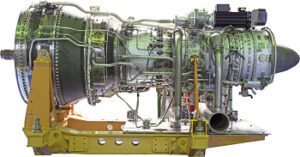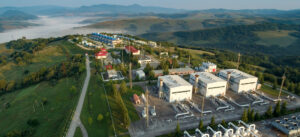
According to the company’s financial statements, the net profit of the Ukrainian GTS Operator LLC (GTSOU) for 2024 amounted to UAH 2.8 billion.
As the company reported on Wednesday, the Supervisory Board of GTSOU at its regular meeting on April 4 recommended that the general meeting (Ministry of Energy of Ukraine) approve the annual financial statements for 2024.
“Despite the end of natural gas transit, which had a significant impact on the impairment of the company’s assets at the end of the reporting year, the company made a profit of almost UAH 3 billion last year and is ready to pay significant dividends to the state budget,” said Dmytro Lypa, CEO of GTSOU.
The company, in particular, appealed to the Ministry of Energy with a proposal to approve the allocation of 75% of net income, namely UAH 2.1 billion, to pay dividends to the state budget.
The statutory audit of GTSOU was conducted by the independent auditing firm Crowe Erfolg Ukraine, which issued an unqualified audit opinion.
“The company’s financial statements for 2024 present fairly, in all material respects, the financial position of GTSOU as of December 31, 2024, and its financial results and cash flows for the year in accordance with international financial reporting standards,” the auditor’s report cited by the company states.
Gas TSO of Ukraine LLC is a natural monopoly that provides natural gas transportation to consumers in Ukraine and the EU. Since January 1, 2020, GTSOU has been a certified operator of the Ukrainian gas transportation system, completely independent of vertically integrated enterprises. In 2024, GTSOU generated over UAH 38.5 billion in revenue.
On October 27, 2023, as part of the corporate reform, 100% of the GTSOU’s authorized capital was transferred to the Ministry of Energy of Ukraine.

“In January-July 2024, the Ukrainian Gas TSO purchased 128.1 million cubic meters at the Ukrainian Energy Exchange (UEEX), the company’s press service reports.
According to it, the operator concluded 82 agreements with 18 sellers, in particular, in July, GTSOU bought 29.9 million cubic meters at the UEEX, concluding 18 contracts with 10 sellers.
“The operator is interested in expanding the range of counterparties and building long-term mutually beneficial relations with the market. The company plans to actively offer participants a full list of procurement products, in particular to non-resident participants with the delivery of “border of Ukraine” and with the delivery of UGS “customs warehouse”,” the statement said.
GTSOU provides natural gas transportation to consumers in Ukraine and the European Union.

Gas TSO of Ukraine LLC has entered into an agreement with Motor Sich PJSC for the purchase of three new 6 MW gas turbine power plants for UAH 527.364 million (including VAT).
According to the announcement in the Prozorro e-procurement system, the delivery period is until October 31, 2024. The effective efficiency of the plants is at least 30.8%, and the service life before the first overhaul is at least 25 thousand hours.
“Motor Sich will also supervise the installation, commissioning and start-up of three units in Kharkiv region for UAH 8.952 million (including VAT).
GTSOU provides natural gas transportation to consumers in Ukraine and the European Union.
“Motor Sich is one of Europe’s largest manufacturers of aircraft engines and industrial gas turbines. On November 5, 2022, the Supreme Commander-in-Chief’s Office decided to seize the shares of five companies, including Motor Sich, as military property for the duration of martial law.

In 2024, Gas TSO of Ukraine LLC (GTSOU) plans to invest UAH 812.923 million in the development of the gas transmission system through depreciation charges.
This is stated in the resolution of the National Energy and Utilities Regulatory Commission (NEURC) on the approval of the GTSOU’s GTS Development Plan for 2024-2033, approved at a meeting on Wednesday.
“The main directions of the Gas Transmission System Development Plan for the first year (investment program for 2024) of the 10-year development plan are financing for: compressor stations – UAH 431,768 thousand (excluding VAT), gas distribution stations – UAH 60,226 thousand, gas pipelines – UAH 53,037 thousand,” the regulator said in its justification for the approved document.
In 2024, GTSOU also plans to spend UAH 85,996 thousand on the implementation and development of information technologies, UAH 63,200 thousand on the purchase of diagnostic and inspection devices and other devices, UAH 53,017 thousand on the modernization and purchase of vehicles, special machines and mechanisms, UAH 48,240 thousand on the purchase of production equipment, and UAH 17,439 thousand on industrial buildings and design and survey works.
The overall 10-year plan for the development of Ukraine’s GTS provides for a total funding of UAH 43.756 billion.

“In 2024, Gas TSO of Ukraine will create 167 new mobile teams to service gas distribution stations (GDS), the company’s press service reports.
According to it, the equipment maintenance and repair project is part of GTSOU’s strategy to improve the reliability and efficiency of the gas transmission system.
Currently, 43 mobile teams are working within its framework, each of which serves its own “bush” – several gas distribution stations and the adjacent linear part of gas pipelines. In 2024, the maintenance teams will service 819 GDSs.
A similar practice of gas infrastructure maintenance is used in Europe. In particular, GTSOU was guided by the experience of the Italian operator Snam, which maintains not only GDSs, but also the linear part and compressor stations in this way.
“Mobile maintenance is an efficient use of resources through the involvement of personnel in servicing, first of all, gas distribution systems. The application of this approach involves a number of measures, including a significant improvement in the condition of the gas distribution system. If the technical condition of the facility allows us to change the form of maintenance, we include it in the service area of the mobile maintenance unit,” explained Yuriy Zyabchenko, Chief Engineer of GTSOU.
To ensure that the work of mobile teams meets the standards of European operators, is automated and transparent, GTSOU requested and received technical assistance from USAID through the Energy Security Project to purchase a mobile application.
“Already in 2024, mobile teams will use the mobile application in their work as the main tool for recording information on the technical condition of equipment. This will help improve the quality of maintenance and repair of gas infrastructure and reduce the number of emergency shutdowns,” the operator reminded.

NJSC Naftogaz Ukrainy in a letter sent to the government at the beginning of this year warned of the risks of balancing the gas transmission system (GTS) of Ukraine in the current heating season, which, according to the company, are associated with the problems of forming sufficient natural gas resources for these purposes by Gas Transmission System Operator Ukraine (GTSOU).
In a copy of the document available to the Interfax-Ukraine agency, Naftogaz notes that, according to the law on the natural gas market, GTSOU must purchase gas for these purposes “in a non-discriminatory and transparent manner and on market conditions.”
It notes that the current legislation in no way imposes on the participants in the natural gas market, in particular on Naftogaz, the obligation to provide the balancing service to GTSOU.
According to Naftogaz, GTSOU did not provide, as provided for by European rules, the possibility of trading gas for the needs of balancing the system on liquid exchanges or on its own trading platform.
Naftogaz recalled that the contract between GTSOU and the subsidiary of Naftogaz, Naftogaz Trading gas supply company LLC, on the provision of balancing services by the latter expires on January 19, 2022, and a new similar tender in December 2021 failed due to insufficient interest from market participants in the conditions proposed by GTSOU.
Naftogaz informs that it does not see an opportunity to participate in a new tender for the purchase of balancing services by GTSOU for 2022. According to Naftogaz, the GTS operator, by purchasing the balancing service from Naftogaz, actually resells it to gas market entities (primarily Naftogaz) and receives super profits.